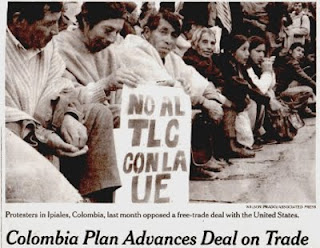As I read an article in the NY times about it, I saw a photo of farmers from Ipialis, Colombia protesting, coming together holding signs denouncing the deal. It dawned on me that as part of the trade deal, industrial and Agricultural goods would have duties lifted immediately and the other 20% would be phased out over 10 years. This means Colombian companies and government agencies would be paying less for importing goods from the US (since no custom duty taxes/fees will be added)and could potentially use the savings to buy even more goods from US companies. This sounds like a boon for US companies, and it might be. However what I realized as I stared at those farmers in the NY times Photograph, was the effect on them. Their Agricultural products would now be competing with imports from the US which have become cheaper to acquire if the trade agreement goes through (which it mostly likely will as Republicans have been pushing for it for sometime). To compete, these farmers would need to drop their prices and as a result, incomes for them, drop. If many of these farmers are already impoverished, barely making enough working on the farm to get by, the developments of a trade deal may be devastating financially for them. This has fueled reason for protests against the deal, protest which are being organized and conducted in Colombia itself.
It seems as if this is what has been done in a sense to the average American worker, also effected by the effects of globalization and free trade. As Companies shipped jobs overseas and outsourced many functions to countries paying less then wages expected by Americans, their job security and feeling of optimism for a bright future, soon dimmed. Now what we have is a case of companies flush with cash from the ability to borrow at such low rates, can now begin to push some of that cash into the economy by hiring and expanding. HOWEVER, although this seems like a good thing and the path to recovery, many of these companies hire back these same workers at a fraction of the wage/salary previously made.
For example, General Motors and the United Auto Workers changed a provision in their labor contract allowing workers to start at $14 vs. the $28 per hour before the provision was changed. That is a 50% drop!!! Just like the farmers in Colombia who now are faced with having to drop their prices substantially to compete with American Companies, Workers in America have dropped wages, as they compete with other job seekers here and across the world, for the same positions. As the Colombian Economy may very well eventually grow through increased trade, the local farmers may be the ones shouldering the burdens that might result from a trade deal.




2 comments:
I really appreciate your post and you explain each and every point very well.Thanks for sharing this information.And I’ll love to read your next post too.
stock Tips
Thank you very much, I appreciate it. I am always happy to receive feedback or additional thoughts on what I post. I read and research frequently and try to posts about things that I and others may find interesting. I appreciate your visit and comments very much. thanks again~
Post a Comment